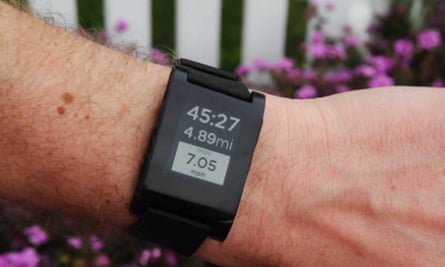FitBit, Jawbone, FuelBand, MyFitnessPal, Lose It, RunKeeper, Endomondo, MapMyRun, Withings, Moves, Foodzy, GymPact, WeightConnect, Fitocracy, Runtastic, Striiv, Tictrac… Just a few of the services and/or gadgets trying to help us quantify ourselves in 2013.
Whether we're tracking calories, steps, workouts or sleep (or not uncommonly, all four), there's a bustling industry of startups – together with big guns like Nike – hoping to collect and analyse that data on our behalf.
Investment is pouring into the sector from investors, the most popular apps are attracting millions of users, and new hardware (from Samsung's Galaxy Gear smart watch to the M7 motion co-processor inside Apple's iPhone 5s) is paving the way for more innovation from these services.
Yet in 2013, there's also a warning light flashing for some people around privacy: questions about what these startups are doing with our data, which could be of interest to employers, insurance companies and the authorities in ways we may not always welcome.
An interesting time, then. RunKeeper, an app for tracking running, walking, biking and other activities, is one of the services gaining traction. According to chief executive Jason Jacobs, it's a positive time.
"The trends are really starting to accelerate for this to being more mainstream. You've got the sensors that are coming out in the smartphones and now the wearables, as well as the internet of things that sits on top of all these devices and makes them smarter," he says.
"There are more than 23m people using RunKeeper, and the active base has more than doubled in 2013 to date. Not only does the base continue to grow, but as that base gets larger, the percentage that it's been growing has also been increasing."
RunKeeper has been evolving fast over the last year, most recently with version 4.0 for iPhone, following other developers in stripping back the interface to fit in with iOS 7.
It's also playing a more active role, from (optional) push notifications reminding users to workout to a new series of training programmes geared to specific goals, such as training for a 5k run or losing weight.
"Tracking to us isn't where the real value lies. The value lies in driving engagement and improvement over time, so we've been spending our time helping people get better results around their data in a sustained way" says Jacobs.
"Whether you're training for your first 5k, walking a certain amount of miles or losing a certain amount of weight, people do need help, especially the more casual users. People that follow these formal training programmes, their engagement goes through the roof."
The more you use an app like RunKeeper, the more data it has on you – and the more interesting that data becomes for other companies. Employers or insurance companies wanting to know how active you are, for example, or advertisers who'd love to be able to target campaigns at groups like dieters or joggers.
A recent report claimed that 20 of the most popular health-tracking apps were sharing users' data with nearly 70 third-party companies, while big insurance companies were starting to partner with these startups.
RunKeeper is involved in the latter trend as one of the partners for US insurance company Aetna's CarePass scheme, although users have to explicitly connect their RunKeeper account to CarePass before any data is shared.
How is the company approaching privacy issues? "We take the responsibility very seriously. You have to put people in control of their own health information, and not steer down a wrong path," says Jacobs.
"We've been very careful along the way to make sure we put users squarely in control of their own information, including being able to export all of their data at any time."
He plays down the significance of insurance companies' interest in the health-tracking space, while pointing to the possible benefits for people who opt in to schemes that, for example, save them money on their health insurance premiums.
"Some people see this as beneficial: getting money back without having to save their gym receipts for three months in a roa. But other people want no part of that," he says. "With anything we do, the important things are transparency, and that it's squarely under the control of the user."
One of the trends that will see apps like RunKeeper collecting more data is the emergence of new wearable devices, smart watches in particular. RunKeeper has already launched an app for Samsung's new Galaxy Gear smart watch, and its Android and iPhone apps work with the Pebble smart watch too.
"Wearables like smart watches are starting to bring fitness into a more compelling form factor: into a general purpose wearable device. It's only a matter of time before watches untether themselves from the phone," says Jacobs.
"It's going to take some time for the technology to get there, but it's inevitable that it will happen. I don't think smart watches are going to be a replacement for the smartphone. They're a category in themselves that creates a whole new wave of use cases that will be most compelling on the watch, and fitness is an obvious one."

Jacobs is also enthusiastic about Apple's iPhone 5S and its M7 motion co-processor, which is designed to gather data on people's motion using various sensors, then make it available to compatible apps with less of a strain on battery life.
"With RunKeeper, one of the pieces of magic is how little you have to do other than opening the app, hitting start and then hitting stop after your activity. In the future, though, you'll be doing even less," he says.
"Apple's announcement is a step in that direction. If the sensors can run passively in the background, you don't have to do anything to hit start and stop. But it's good news and bad news."
The bad news isn't really bad news for people, more a competitive challenge for RunKeeper: as Apple commoditises core motion-tracking technologies, many more developers will be able to launch activity-tracking apps. But the good news?
"The good news is that all that extra resource you would have spent on doing tracking well, optimising battery life and accuracy… you don't have to worry about that any more," says Jacobs.
"You can just focus on the user experience. Getting social, notifications and guidance right: all the things that drive measurable improvement to people's behaviour."
While the M7 may fuel another burst of new apps to challenge RunKeeper, in the slightly longer term, Jacobs sees consolidation coming for the activity-tracking market, as unpopular apps die and those with traction and/or good technology get acquired.
"Right now it's a fairly fragmented landscape, but ultimately it's pretty clear there will be consolidation, and out of the other side there'll be a handful of big, enduring companies that get built in this space," he says.
"I do think some companies will get acquired and others will go away. It's better for everybody if a handful of big, trusted companies get built that are enduring, and give a user a holistic view across their data. And of course, everyone wants to be one of those handful of companies."
Including RunKeeper. While Jacobs doesn't divulge any acquisition plans for the company, whose last round of funding was $10m in November 2011, he does say there are plans for deeper partnerships with apps in "adjacent" categories, citing MyFitnessPal and Jawbone UP as two examples.
"In each category there's a handful of companies we believe are doing things right, so we're going to work more closely with them to deliver a more consolidated experience to users," says Jacobs.
"We're really investing in the software side: you're going to see big improvements from us and others in the next several months."
Meanwhile, there'll be better hardware to take advantage of: more, cheaper and smarter sensors inside smartphones and wearables, which in turn will get more people making use of these sensors, and the apps that they power.
He also promises that the apps themselves will get smarter, going beyond their roots as pure trackers. "There's a lot of data out there, but you've not seen people really using that aggregated data to drive better decision-making for the end users," he says.
"As Amazon got bigger, it got smarter at delivering a more personalised shopping experience. As we build smarter data products, we think there are really exciting possibilities for companies like us."
One example: RunKeeper has a mass of data on where people are running in the real world, which on an anonymised, aggregated basis could help it to publish details of popular running routes for its users.
"When we think about data, that is the stuff that gets us really excited," says Jacobs, who suggests that the path to ethically making money from people's data lies in this kind of feature, rather than in selling that data to third parties.
"You see the negative [privacy] stuff in the press, and I hope no one goes down that path, but we are a user-focused company, and we're building this to drive results for users," he says. "When we ultimately focus on business models, it'll be about those things that make the user experience better."

Comments (…)
Sign in or create your Guardian account to join the discussion